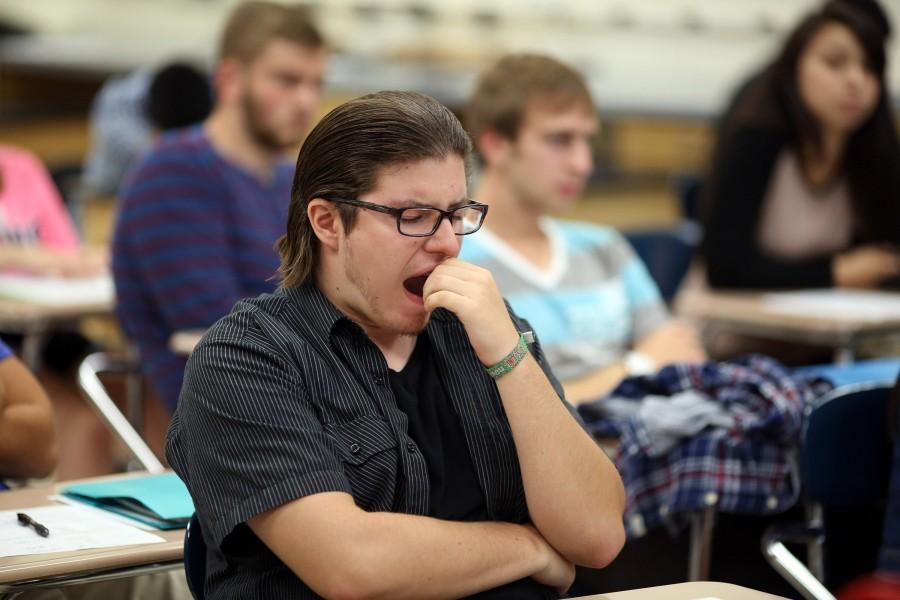School day needs to start later
Matt Goodmanson, a junior, yawns during teacher Rich Schram’s eighth period honors physics class Aug. 28, 2014 at Buffalo Grove High School in Buffalo Grove, Ill. The American Academy of Pediantrics issued a statement saying school start times should be pushed to 8:30 a.m. or later, as many students aren’t getting enough sleep. (Brian Cassella/Chicago Tribune/MCT)
November 16, 2014
How many hours of sleep did you get last night? It’s probably less than what the doctors recommend and this is a problem. We need more sleep and schools need to start later.
Every night around 10:30 pm, my mother tells me goodnight and to try not to stay up too late. I would love to go to bed earlier than 12:30am, but I can’t because I have to stay up and study for a test or finish homework.
According to the neurosciences center of Nationwide Children’s, the average teenager gets fewer than 7 hours of sleep every night, but they should get 9 ¼ hours of sleep. After school teens may have sports, jobs, and homework that may cause them to stay up longer than planned.
In addition, the National Sleep Foundation reveals the natural time for teens to fall asleep is around 11 pm, an extra 2 hours later than most adults. Our brain releases melatonin at a later time causing us to not feel tired around the normal time of 9 pm.
Since we fall asleep a couple hours later than other people, we should be able to start school at a later time.
Junior Lauren Egensperger said, “I usually go to bed around 11-11:30 after I get all my homework done. I would definitely prefer school to start later even if it meant for us to stay later than normal.”
Technology is another factor for why people are staying up later. The brightness of the screen and the constant distractions will make people more alert, said the Child Mind Institute.
According to the National Sleep Foundation, there are many factors caused by not enough sleep including depression, emotional and behavioral problems, drowsy driving, poor impulse control, violence, health complaints, impaired cognitive function, and lower overall performance in everything.
Psychology teacher Brittany Pumphrey said, “Students habitually getting less than the recommended number of hours of sleep are slightly saddled with a cognitive deficit, a slightly tired sixth grader performs at a fourth grade level. Multiply that by the time high school rolls around, the students struggle with an extreme sleep debt that puts them at a severe disadvantage compared to fully rested.”
Last month the American Academy of Pediatrics released a new recommendation to middle and high schools to start no earlier than 8:30 am. Pumphrey said, “Even an hour would make a noticeable difference. Late start Wednesdays are a perfect example; the level of student alertness and engagement is completely different than the other days, due to the extra sleep gained.”
Junior Isabel Lardner called our early start time “ridiculous”
There are many advantages to starting school at a later time. For example, there would be better attendance, less tardies, fewer trips to the school nurse, more alertness during the school day, a calmer atmosphere, and less stress. These would lead to a better performance in school work and grades.
According to the National Sleep Foundation, Dr. Kyla Walhstrom at the University of Minnesota did a study to demonstrate the impact of moving school start times. Seven high schools moved their start time from 7:15 to 8:40 am. Dr. Walhstrom found that students gained an extra five or more hours of sleep. In addition, students had better attendance and enrollment rates, increased daytime alertness, and decreased student-reported depression.
If the school board is aware that doctors say that middle and high schools should not start 8:30 am and they have all the facts, why do we start school at 7:30 still?






















































